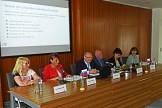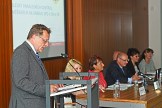The SAO and the SAI of Slovakia performed a joint audit operation: The excise duty administration is similar in both countries, more expensive in Slovakia
PRESS RELEASE – June 20, 2017
The Supreme Audit Office (SAO) organized an event to present the final report on the results of parallel audits of the excise duty administration in the Slovak Republic and in the Czech Republic. Top representatives of supreme audit institutions of both countries signed up the joint final report during a meeting that took place in Bratislava, Slovakia, in May 2017.
“Excise duty taxes constitute the third most important source for the Czech national budget as the annual collections make approximately CZK 145,000 million. The effective duty administration is of significant importance for the consumers’ protection, like for instance, during the affairs of the 2012 Czech Republic methanol poisonings or the vehicle damages caused by fuels of poor quality”, said President of the SAO Mr. Miloslav Kala. Representatives from both SAIs acknowledged that their joint audit operation had achieved the pre-set goals and met their expectations.
In spite of the fact that both the Czech Republic and Slovakia follow common EU legislation on this matter, the audit provided an opportunity to ascertain how the excise duty administration system is set up, and reveal the differences between the systems in Slovakia and in the CR. When EUR 1 is spent on the excise duty administration, EUR 222 are collected in the CR, but only EUR 52 in Slovakia. In conclusion, the excise duty administration in the CR is four times more effective than in Slovakia.
The excise duty administration also requires more staffing in Slovakia, for example during the supervision of taxable entities. In Slovakia, the electronic system for tracking of products subject to excise duty, which was introduced in the period 2012–2015, cost roughly 2.3 times more than in the CR. On the other hand, the processing of tax returns is fully computerized in Slovakia, while the Czech Customs Administration only uses interactive forms of tax reports, which cannot be further processed by automatic means. The distribution of alcohol and tobacco check bands is easier for the Slovak tax administrator. In both countries, the excise duty systems do not impose higher tax on environmentally unfriendly energies, do not help to fight against alcohol and tobacco abuse or promote lower labour taxation.
The greatest benefits of the audits consisted in the exchange of experience, identification of differences and good practice. Last, but not least, auditors found out that international comparability of data on efficiency and effectiveness of excise duty administration is extremely limited without performing parallel audits.
Communication Department
Supreme Audit Office

